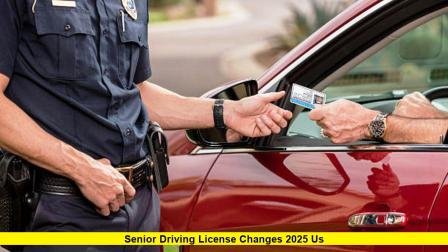Senior driving license changes 2025 US are already in motion, and millions of older drivers are being affected. Starting this year, new renewal requirements and testing rules have been introduced across several states, focusing on safety while balancing independence for aging drivers.
What’s Changing for Senior Drivers This Year
The most notable updates are age-based and aim to make sure drivers remain capable behind the wheel as they grow older. These are the main changes seniors can expect in 2025:
- Drivers aged 70–79 must now complete a mandatory vision screening at every renewal. In some states, this can be done virtually through telehealth, while others require in-person testing.
- Drivers aged 80–86 may also face additional checks, such as reaction-time or cognitive assessments, especially if there are concerns raised by family, physicians, or licensing officials.
- Drivers aged 87 and above are now required to take an in-person road test annually before their license can be renewed.
Renewal timelines are no longer uniform. Instead, they vary depending on age brackets, with stricter oversight as drivers enter their eighties and beyond. Some states have also updated their laws to delay the age at which road tests are required, reflecting a growing push to respect ability over age.
Key Points Summary – Quick Look for Fast Readers
| Age Group | Renewal Frequency | Required Tests | Notes |
|---|---|---|---|
| 70–79 | Every few years | Vision screening | Test required at each renewal |
| 80–86 | More frequent | Vision + possible cognitive | Triggered if concerns are reported |
| 87+ | Every year | Full road test | Mandatory annual requirement |
| State Variants | Varies by law | Vision + road/cognitive test | Some states raised mandatory road test age |
Why These Changes Are Happening
The senior driving license changes 2025 US are largely motivated by two key goals: road safety and driver independence.
As Americans live longer and healthier lives, many continue driving well into their seventies, eighties, and beyond. While this independence is valuable, aging can also bring challenges such as slower reaction times, vision decline, or memory issues. Regulators want to ensure that these factors are monitored carefully to reduce risks on the road.
At the same time, the changes aim to avoid unnecessary restrictions. By focusing on ability rather than age alone, states hope to reduce discrimination while still protecting public safety. For example, drivers in their eighties who demonstrate strong vision and reflexes may continue driving without problems, while those with noticeable difficulties may be flagged for additional checks.
Read also-US Senior Drivers License Changes: What Older Drivers Need to Know Right Now
How Seniors and Families Can Prepare
The new requirements don’t need to feel overwhelming. With a little preparation, most drivers can navigate the process smoothly:
- Check your renewal schedule early. Don’t wait until your license is about to expire—know whether you’ll need an appointment, a vision test, or a road test in advance.
- Schedule health checks proactively. Eye exams, reaction-time assessments, and routine check-ups can help identify issues before they affect driving ability.
- Communicate openly. Families should feel comfortable discussing driving safety with aging loved ones, and seniors should be open to feedback from doctors or relatives.
- Stay organized. Keep glasses, medical notes, and updated paperwork ready for renewal appointments.
- Practice driving confidence. If a road test is coming up, consider refreshing skills through a defensive driving course or practice sessions with a family member.
The Bigger Picture
These updates reflect a broader cultural shift. Instead of automatically limiting seniors as soon as they reach a certain age, policies are being refined to focus on capability and safety. Seniors who remain healthy, alert, and skilled behind the wheel will still be able to maintain their independence.
At the same time, families, doctors, and local agencies are being encouraged to play a more active role in identifying when a driver may no longer be safe. This shared responsibility helps ensure that seniors aren’t unfairly restricted while also reducing risks for everyone on the road.
Looking Ahead
The senior driving license changes 2025 US are a reminder that driving is both a privilege and a responsibility. For many seniors, these rules will simply mean scheduling an extra appointment or test. For others, they could be the beginning of a transition to different forms of transportation.
Either way, the goal is clear: safer roads and more thoughtful policies that respect aging drivers while keeping communities protected.
If you or a loved one are approaching these new requirements, now is the time to prepare. Staying informed and proactive can make the process smooth and stress-free.
How are you or your family adjusting to these updates? Share your thoughts and experiences below to help others who are navigating the same journey.
